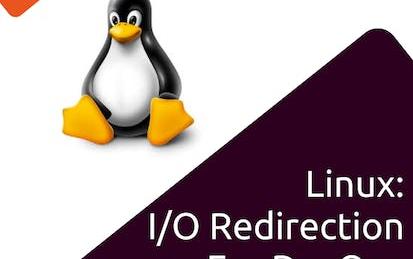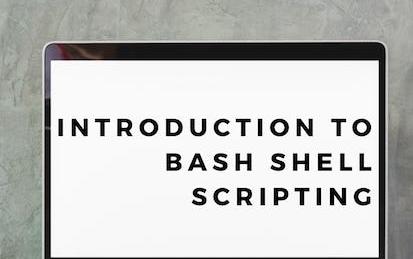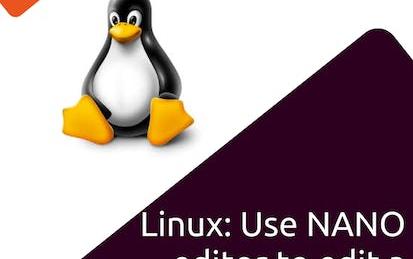

Our Courses

Advanced Commands in Linux
In this one-hour, project-based course, you'll learn advanced commands for the Linux command-line.
-
Course by

-
 Self Paced
Self Paced
-
 3 hours
3 hours
-
 English
English

Create Fault Tolerant MongoDB Cluster
In this course, you will create a MongoDB replica set on a single Linux server to become familiar with the setup.
-
Course by

-
 Self Paced
Self Paced
-
 3 hours
3 hours
-
 English
English

Linux: I/O Redirection for DevOps
In this 1-hour long project-based course on Linux i/o redirection for DevOps you will be working entirely on the command line and using powerful Linux commands and redirection operators to learn how input and output redirection works in Linux. You will get experience of taking control of what happens to the stdin and stdout of all your commands and no longer be confused about the details on how piping and redirection works in Linux. This course is designed for any person working or who intends to work with Linux, from Linux system administrators to developers and DevOps practitioners.
-
Course by

-
 Self Paced
Self Paced
-
 3 hours
3 hours
-
 English
English

Introduction to Bash Shell Scripting
This course will help those new to shells and shell scripting to build a foundation with the Bash shell. We'll learn several Bash shell commands that will allow you to navigate and use the shell for everyday tasks. We will also write a Bash shell script that will back up a directory and email the compressed file, a culmination of all the commands we’ll cover. We will cover: Not only will you gain the knowledge to customize your system, you will have a solid foundation to expand what you can do with Bash on the command line and in scripts.
-
Course by

-
 Self Paced
Self Paced
-
 3 hours
3 hours
-
 English
English

Exam Prep CKA: Certified Kubernetes Administrator
Kubernetes (K8s) is an open-source system for deploying, scaling, automating, and managing containerized applications. This automation helps in improving productivity, efficiency, and reduction of operational downtime for enterprises. This training course helps you develop your skills and knowledge in Kubernetes. In addition, you can also explore basic to advanced concepts of Kubernetes such as Pods, Nodes, Schedulers, Replication Controller & Replica Sets, etc.
-
Course by

-
 Self Paced
Self Paced
-
 19 hours
19 hours
-
 English
English

Wireshark for Beginners: TCP IP Protocol Fundamentals
This guided project, Wireshark for Beginners TCP/IP Protocol Fundamentals, will help a beginning security analyst who is looking to use Wireshark to analyze Transmission Control Protocol and Internet Protocol (TCP/IP ) network packets through the use of HTTP and HTTPS requests in order to understand the protocol.
-
Course by

-
 Self Paced
Self Paced
-
 2 hours
2 hours
-
 English
English

Secure Networked System with Firewall and IDS
In this MOOC, we will focus on learning how network systems are secured using firewalls and IDS. This will include understanding the basic components of network security, constructing a dual-firewall DMZ, and defining security policies to implement and enforce these rules. Building upon these lessons we will go in-depth on the popular Linux firewall. Finally we will learn about Network IDS and Host IDS, including a deep dive into Snort.
-
Course by

-
 Self Paced
Self Paced
-
 9 hours
9 hours
-
 English
English

Use Bash Scripting on Linux to Execute Common commands
By the end of this project, you will use a bash script to execute commands and observe their output on a Linux system.
-
Course by

-
 Self Paced
Self Paced
-
 3 hours
3 hours
-
 English
English

Decision Control Constructs in C# on Linux
By the end of of this project you will create a guessing game application that pits the computer against the user.
-
Course by

-
 Self Paced
Self Paced
-
 2 hours
2 hours
-
 English
English

Linux: Use NANO editor to edit a Bash Script
In this 1-hour long project-based course on Use NANO Editor to edit a Bash Script, you will be working entirely in the Bash shell and using powerful Nano commands to learn how we can fully work with files without the need of an IDE or text editor GUI.
-
Course by

-
 Self Paced
Self Paced
-
 3 hours
3 hours
-
 English
English

Cloud Data Engineering
Welcome to the third course in the Building Cloud Computing Solutions at Scale Specialization! In this course, you will learn how to apply Data Engineering to real-world projects using the Cloud computing concepts introduced in the first two courses of this series. By the end of this course, you will be able to develop Data Engineering applications and use software development best practices to create data engineering applications. These will include continuous deployment, code quality tools, logging, instrumentation and monitoring.
-
Course by

-
 Self Paced
Self Paced
-
 17 hours
17 hours
-
 English
English

Files and directories in the Linux filesystem
In this project, you will use Linux commands to traverse Linux directories and list files. You will also learn where certain files are stored, how to change permissions to allow access, and how to decide where files should reside. Linux is a popular operating system that is based on the Unix operating system. It has many distributions which have different interfaces for installing software, different user interfaces, and so on. Each distribution has a similar filesystem with directories used to house and organize files.
-
Course by

-
 Self Paced
Self Paced
-
 2 hours
2 hours
-
 English
English

LCFA Practice Course
This course aims to prepare you for working as an information technology professional. In this course, we will be drill into the domains on the Linux Foundations Certified IT Associate exam.
-
Course by

-
 Self Paced
Self Paced
-
 11 hours
11 hours
-
 English
English

Set up your dev environment for LAMP web developers on Linux
By the end of this project, you will set up your development environment for LAMP web developers on Linux.
-
Course by

-
 Self Paced
Self Paced
-
 3 hours
3 hours
-
 English
English

Introduction to Network Automation
The Network infrastructure industry has undergone a significant transformation in recent years, with an increasing need for automation due to factors such as a demand for faster and more reliable network deployments.
-
Course by

-
 Self Paced
Self Paced
-
 3 hours
3 hours
-
 English
English


LCFA Exam Preparation
This course is ideal for those getting started in an IT career as an administrator/engineer who want to become a Linux Foundation Certified IT Associate (LFCA). The LCFA Exam Preparation course is designed to introduce learners to the sponsor organization behind the LFCA certification exam and the details of taking the LFCA exam. This class helps learners prepare for the LFCA exam through a series of self-paced learning, readings, discussions and practice exams.
-
Course by

-
 Self Paced
Self Paced
-
 7 hours
7 hours
-
 English
English

Introduction to Visual Basic Programming
This course is the second course in a series that aims to prepare you for a role working as a programmer. In this course, you will be introduced to the five main concepts in procedural programming: user input, console output, variable declaration and assignment, decision branching and iteration. Labs will allow the students to apply the material in the lectures in simple computer programs designed to re-enforce the material in the lesson.
-
Course by

-
 Self Paced
Self Paced
-
 28 hours
28 hours
-
 English
English

Foundations of Computer Science
Welcome to Introduction to Programming: Visual Basic. In the course sequence you will learn to write programs that utilize both procedural and object oriented techniques to solve business problems. In the first course in the sequence we will provide you with a solid foundation in the computer science topics that are important to understand when programming Visual Basic. In courses two through four, we will role up our sleeves and start coding in Visual Basic. In these courses you need to have access to a computer that is running Windows, macOS or Linux with the .NET 5 installed.
-
Course by

-
 Self Paced
Self Paced
-
 16 hours
16 hours
-
 English
English

Tools of the Trade: Linux and SQL
This is the fourth course in the Google Cybersecurity Certificate. These courses will equip you with the skills you need to apply for an entry-level cybersecurity job. You’ll build on your understanding of the topics that were introduced in the third Google Cybersecurity Certificate course. In this course, you will explore computing skills that you’ll use on-the-job as a cybersecurity analyst. First, you'll practice using Linux, an operating system commonly used by cybersecurity professionals.
-
Course by

-
 Self Paced
Self Paced
-
 27 hours
27 hours
-
 English
English

C Programming: Modular Programming and Memory Management - 3
Enhance your coding skills along your path to becoming a proficient C programmer with the essential concepts of functions and pointers. In this course you will be introduced to the concept of modular programming: that is, dividing up more complex tasks into manageable pieces. You will learn how to write your own functions (just like functions in mathematics for example).
-
Course by

-
 Self Paced
Self Paced
-
 10 hours
10 hours
-
 English
English

Real-Time Embedded Systems Theory and Analysis
This course can also be taken for academic credit as ECEA 5316, part of CU Boulder’s Master of Science in Electrical Engineering degree. This course provides an in-depth and full mathematical derivation and review of models for scheduling policies and feasibility determination by hand and with rate monotonic tools along with comparison to actual performance for real-time scheduled threads running on a native Linux system.
-
Course by

-
 Self Paced
Self Paced
-
 60 hours
60 hours
-
 English
English

Build File Utilities with Linux Shell Script
In this 1.5 hour guided project, you will learn about the Linux file system.
-
Course by

-
 Self Paced
Self Paced
-
 3 hours
3 hours
-
 English
English

Package Installation in Linux
In this one-hour, project-based course, you'll learn several ways to install and update applications in Linux.
-
Course by

-
 Self Paced
Self Paced
-
 2 hours
2 hours
-
 English
English

Build a Guessing Game in C# on Linux
By the end of of this project you will create a guessing game application that pits the computer against the user. You will create variables, static methods, decision constructs, and loops in C# to create the game. Traditionally, C# and other Microsoft languages have been limited to the PC with Visual Studio as the IDE. Dot Net has been open-sourced and is now available on Linux.
-
Course by

-
 Self Paced
Self Paced
-
 2 hours
2 hours
-
 English
English



